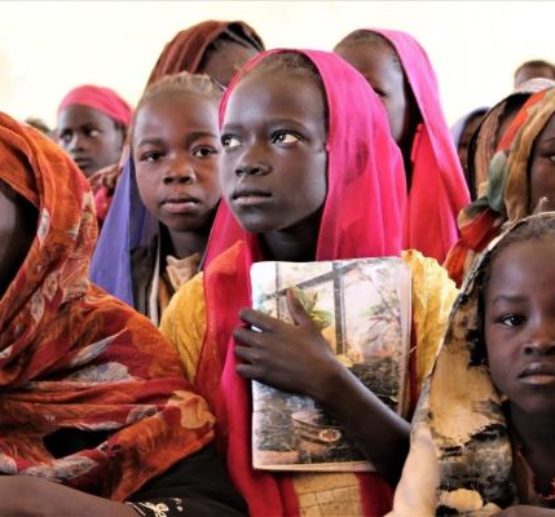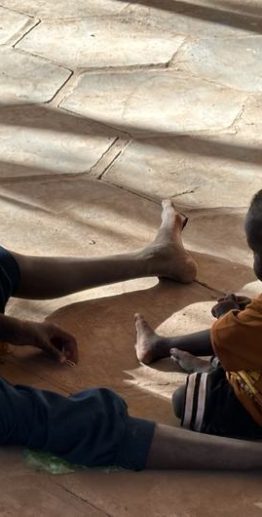An Empowering Weekend with Darfur Women Action Group

“It’s about action, not words”—these were part of the opening remarks from Elizabeth Blackney, media strategist and advocate, at the 2013 Darfur Women Action Group (DWAG) Symposium. Indeed there were a lot of words shared over the two day conference, but there was an even more urgent call to action by the many awe-inspiring panelists including women activists from the Democratic Republic of the Congo, Sudan, Syria, student activists, a UN representative, and many more.
The conference opened with remarks from the Darfur Women Action Group’s Chairwoman who reminded us that the species cannot survive if genocide is tolerated. This makes the appeal to end genocide personal, because it is true. Genocide is a crime against humanity, and therefore it is a crime against you and me. Niemat Ahmadi, founder of DWAG, gave a moving speech about her experiences in Darfur and provided some history about the creation of DWAG as a way to empower local voices to enact meaningful change. Niemat spoke powerfully as she reminded us that “Darfur is an example of the world’s inaction”. Equally as abhorrent is the continued use of sexual violence against women which is used as a weapon of war.
The conference got underway with a powerful session which included women survivors of various conflicts as well as other experts. Maisoon Ibrahim-Ateem, Darfuri and current Sudan Atlas Corps fellow, described the stigmatization of rape and reminded us that genocide is currently happening in Darfur where women are still systematically raped. Darfur women who are attacked are often abandoned by their communities and families. Rape not only inflicts physical and psychological wounds, but it tears the entire community apart and this makes it an “efficient” way to terrorize populations. While rape has been used as a weapon of war for many years, it is only recently that the world is beginning to recognize the severity. More is being done to take action and end the culture of impunity that exists in many conflict areas and throughout our world. Today there is a United Nations official working on sexual violence, and according to Latitia Anderson (specialist with UN Action for Sexual Violence), there are even more tools and training opportunities for peace workers to use to address these issues in communities.
Nita Evele, from Congo Global Action, interjected perspectives from another ongoing atrocity in the Democratic Republic of the Congo where she claims that there are two types of ongoing genocides: one is an ethnic cleansing and the second is a genocide towards women (note, the conflict in the DR Congo is not labeled a genocide despite 5.4 million people dead). Evele reported about an even more heinous act: whole battalions are raping babies and infecting them with HIV/AIDS as part of a longer term killing plan.
Women and men are clearly targeted during times of conflict, but it is women who are often excluded from the peacemaking process. Panelists from different international and local perspectives came together to discuss this very critical issue. The panelists discussed that women are usually seen as the victims, but they should not be categorized as such. Rather, women are resilient and there need to be more spaces within the peace building arena to share their voices and perspectives on the entire peace process—not just traditional “women’s issues”. Sadly, women are often blamed for an attack, such as rape and then experience the ensuing stigma, but the message from the panelists was to turn that blame around and shame the perpetrators. In fact some communities in Darfur have opened up ways for women and men to report rapes. This helps to empower the communities and women and turns the attention and blame on the people committing such horrible acts.

These things should not have happened—Darfur should never have happened. As Mukesh Kapila says, Darfur is the world’s most successful genocide because it has gone on for so long without intervention. When we talk about genocide, we often throw around the phrase “Never again”. Kapila sees this as a vacant phrase which lulls us into inaction. Kapila’s remarks were strong, and shook the room when he said that genocide is inevitable, and it will happen again. This might seem like a strange thing to say to a room full of young hopeful and enthusiastic genocide prevention advocates, but it is realistic. He urged us to set aside our natural inclination to blame governments and institutions for not doing more to address these atrocities because it removes our personal responsibility. It’s true, we have seen the failure of so many institutions over the last 10 years which have yet to end the violence in Darfur, but we shouldn’t be discouraged—instead, we should be empowered to take action on our own. Find organizations such as Darfur Women Action Group who are providing on-the-ground support to women in need. If I can challenge Kapila, I would agree with him, but add that we need to also empower ourselves to demand more of these failed institutions.
The conference included some great panelists, but there were also powerful young voices as several students shared their experiences ‘standing’ to end genocide. STAND leaders and other student activists from around the country came together to share their perspective on the issues and how to stay motivated. Sometimes the work that we do overwhelms us, and it’s difficult to stay energized and motivated especially when standing up to genocide. First of all, it’s important to remember that even reaching one person with your message can make an impact. One of the founders of STAND also reminded us that sometimes outrageous ideas can make a great impact and attract much needed media attention for the cause. Also, think outside the box, and remember the larger picture—always keep in mind what and who you are working for.
There was even more in store for the conference attendees—much more than a simple blog post can cover. For me it was a transformative weekend to be with such an inspiring crowd. I was energized to be around so many people who are doing such meaningful work to elevate this discussion, and challenge the status quo. When it comes down to it, we are all responsible for each other. We live in a global society where our actions here and now affect people across the globe. We need to take responsibility to learn as much as we can about these conflicts in order to contextualize them—so no one can BS you, as Elizabeth Blackney put it. The first step is education, and then it is action. Educate others about the world around them, and communicate with those institutions that have failed us. Demand more from the people at the top. And of course, when it comes down to it, do the most important thing you can: act. I will leave you with comments from Mukesh Kapila when he said that we have all forgotten that the word “humanitarian” starts with the word “human”—try and save a life, and do this on a regular basis, it is the greatest contribution you can make.
You can save a life by supporting the Darfur Women Action Group here.
A bit about the author: Andalisa Lopez first learned about ongoing mass-atrocities in high school, and from then on she advocated for awareness and action. At Muhlenberg College in Allentown, PA she organized a group of students to discuss international and domestic social justice issues, including genocide prevention. Majoring in Psychology and Media Communications she explored these disciplines in a senior honors thesis which examined race representation in the media, specifically looking at the way Africans are portrayed in US media. Andalisa moved to Washington DC to complete a year with AmeriCorps, and after finishing her service year, she joined United to End Genocide as an intern. Andalisa is excited to learn from her experience at United to End Genocide, and to keep pursuing her interests in social justice and genocide prevention.



